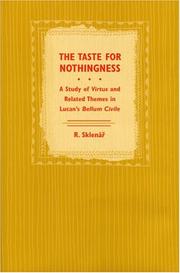| Listing 1 - 3 of 3 |
Sort by
|
Book
ISBN: 0801497019 9781501722950 1501722956 0801422620 9780801422621 9780801497018 1501722964 1501727923 Year: 1990 Publisher: Ithaca, N.Y. Cornell University Press
Abstract | Keywords | Export | Availability | Bookmark
 Loading...
Loading...Choose an application
- Reference Manager
- EndNote
- RefWorks (Direct export to RefWorks)
N. Katherine Hayles here investigates parallels between contemporary literature and critical theory and the science of chaos. She finds in both scientific and literary discourse new interpretations of chaos, which is seen no longer as disorder but as a locus of maximum information and complexity. She examines structures and themes of disorder in The Education of Henry Adams, Doris Lessing's Golden Notebook, and works by Stanislaw Lem. Hayles shows how the writings of poststructuralist theorists including Barthes, Lyotard, Derrida, Serres, and de Man incorporate central features of chaos theory.
Literature --- anno 1900-1999 --- Chaotic behavior in systems in literature --- Chaotisch gedrag in de systemen in de literatuur --- Comportement chaotique dans les systèmes en littérature --- Chaotic behavior in systems in literature. --- Literature, Modern --- History and criticism. --- History and criticism --- Literature [Modern ] --- 20th century --- Literature, Modern - 20th century - History and criticism. --- Chaos theory
Book
ISBN: 9173463434 9789173463430 Year: 1999 Volume: 75 Publisher: Göteborg Acta universitatis Gothoburgensis
Abstract | Keywords | Export | Availability | Bookmark
 Loading...
Loading...Choose an application
- Reference Manager
- EndNote
- RefWorks (Direct export to RefWorks)
Chaotic behavior in systems in literature --- Chaotisch gedrag in de systemen in de literatuur --- Complexiteit (Filosofie) in de literatuur --- Complexity (Philosophy) in literature --- Complexité (Philosophie) dans la littérature --- Comportement chaotique dans les systèmes en littérature --- Diski, Jenny --- Hawkes, John --- Nabokov, Vladimir Vladimirovich --- Sterne, Laurence --- Postmodernism --- United States

ISBN: 0472113100 Year: 2003 Publisher: Ann Arbor University of Michigan press
Abstract | Keywords | Export | Availability | Bookmark
 Loading...
Loading...Choose an application
- Reference Manager
- EndNote
- RefWorks (Direct export to RefWorks)
Lucan, the young and doomed epic poet of the Age of Nero, is represented by only one surviving work, the Bellum Civile, which takes as its theme the civil war that destroyed the Roman Republic. An epic unlike any other, it rejects point by point the aesthetics of Vergil's Aeneid and describes a society and a cosmos plunged into anarchy. Language was a casualty of this anarchy. All terminological certitudes were lost, including those that traditionally attach to the Latin word virtus: heroism on the battlefield, rectitude in the conduct of life. The Taste for Nothingness traces Lucan's own analytical method by showing how virtus and related concepts operate--or rather, fail to operate--in Lucan's appropriations and distortions of the traditional epic-battle narrative in the philosophical commitment of Cato the Younger and in the personalities of the two antagonists, Pompey and Caesar. Much recent scholarship has reached a consensus that Lucan's literary method is mimetic, that his belief in a chaotic cosmos produces a poetics of chaos. While accepting many of the recent findings about Lucan's view of language and the universe, The Taste for Nothingness also allows an even bolder Lucan to emerge: a committed aesthete who regards art as the only realm in which order is possible. Robert Sklenar is Visiting Assistant Professor of Classical Studies, Tulane University.
Chaotic behavior in systems in literature --- Chaotisch gedrag in de systemen in de literatuur --- Comportement chaotique dans les systèmes en littérature --- Cosmologie de l'Antiquité dans la littérature --- Cosmology [Ancient ] in literature --- Deugd in de literatuur --- Kosmologie van de Oudheid in de literatuur --- Nihilism in literature --- Nihilisme dans la littérature --- Nihilisme in de literatuur --- Vertu dans la littérature --- Virtue in literature --- Virtus (Latijn) --- Virtus (The Latin word) --- Virtus (latin) --- Chaotic behavior in systems in literature. --- Cosmology, Ancient, in literature. --- Epic poetry, Latin --- Nihilism in literature. --- Virtue in literature. --- History and criticism. --- Lucan, --- Rome --- History --- Literature and the war. --- Virtus (The Latin word). --- Cosmology, Ancient, in literature --- Latin language --- History and criticism --- Etymology --- Pypłacz, Joanna. --- Lucan --- Epic poetry [Latin ] --- Civil War, 49-45 B.C. --- Literature and the war
| Listing 1 - 3 of 3 |
Sort by
|

 Search
Search Feedback
Feedback About UniCat
About UniCat  Help
Help News
News